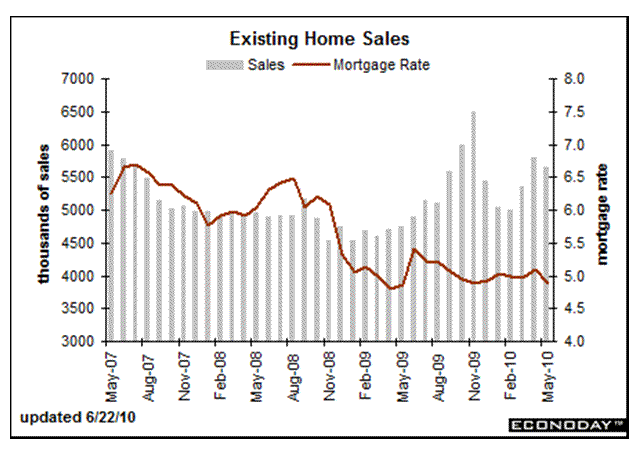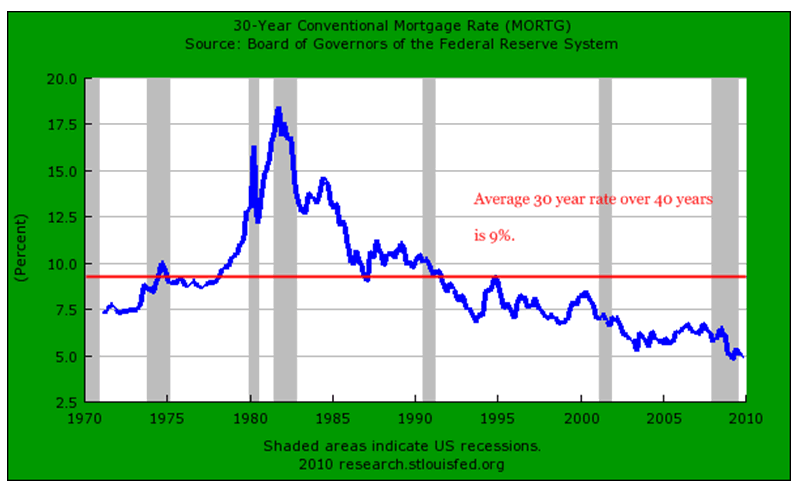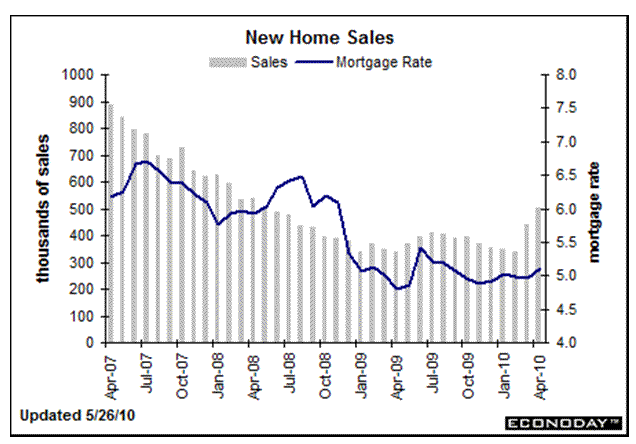Little Surprise in U.S. Housing Market's Dive
Housing-Market / US Housing Jun 23, 2010 - 01:41 AM GMTBy: Andy_Sutton
 Wall Street doubled over in anguish today as the latest numbers on existing home sales hit the news wires. I must say that I am totally confused as to why the decline was any kind of surprise, however. The mainstream press dutifully expressed every emotion from grief to even outrage as the number was reported and analyzed.
Wall Street doubled over in anguish today as the latest numbers on existing home sales hit the news wires. I must say that I am totally confused as to why the decline was any kind of surprise, however. The mainstream press dutifully expressed every emotion from grief to even outrage as the number was reported and analyzed.
Most people have quickly forgotten that the biggest reason there were so many sales to begin with was due to the fact that Congress had waded into yet another market and propped it up with cash on the barrelhead for anyone willing to take the leap. When they lured all the first time buyers they could, they took the next logical step and offered the cash to pretty much everyone else. Couple those actions with the Fed’s active (and now passive) buying of mortgage backed securities and it was bubble mania all over again. Until it wasn’t. That point came at the end of April, when the tax cuts were mercifully allowed to expire, saving our children and grandchildren untold billions.
At that point, I began to have serious doubts as to whether this beaten market could even avoid another crash. I studied the Mortgage Bankers Association reports each Wednesday and watched applications for new purchases fall off a cliff. My contacts in that particular industry said their phones have never been so quiet regarding new purchases. The refinance business kept them busy, but nobody seemed interested in buying a house after April 30. At that point, I wondered how bad May’s numbers would be. It was pretty obvious that the end of the tax credit had pulled at least most of May’s agreements back into April; and quite likely some of June’s as well. Where demand would settle after that was anyone’s guess.

One of the problems with the report on existing homes released today is that the report is based on actual closings. So any one who was hurrying to get locked in during March and perhaps even the early part of April would have had their closing count in May’s number provided it happened before the end of the month. May’s actual purchases for existing homes (or lack thereof) will not hit the statistics until at least June and perhaps July. So the 2.2% drop, while not a surprise, does not reflect base demand for existing housing ex-stimulus. Unfortunately, this was the spin being applied by at least some folks in the MSM. They posited that housing can indeed survive and even thrive without further stimulus and declared the tax credits a smashing success and a fine example of the benefits of government intervention.

However, stimulus in the housing arena has taken on three forms; one fairly transparent; the other two much less so. The transparent stimulus was the tax credits. Many are in fact clamoring for a reinstatement of the credits. Unfortunately, this is an election year, and right now it just isn’t cool to be a big spender – at least not openly. Congress will actually forego having a budget for FY2011. If there is no budget, I guess there can be no budget deficit. Are we really that far along in this charade? We could go a long way down that road without ever finishing this point, however. The second type of stimulus with regard to housing is the ultra-low interest rates that have been created by the Federal Reserve and it’s illicit (and often illegal) actions. These actions have kept 30-year mortgage rates under 5% and that alone has been enticing many people into taking the plunge. In truth, the total amount repaid on a $200,000 mortgage will be over $20,000 less if you can get a 4.8% rate as opposed to 5.25%. The bottom line is that low rates trump tax credits any day of the week. The third type of stimulus – and one that is setting an alarming trend is the number of mortgages being essentially underwritten by the US Government. This number has been hovering somewhere around 50% on average depending on the week.
What must be asked, however, is how much lower mortgage rates can reasonably be expected to go? At the same time rates have been near historic lows, it is more difficult than any time during the last 20 years to actually obtain financing. Many lenders, still ringing from 2007 and 2008’s losses are demanding better financial situations lending in many areas. It is not odd to hear lenders requesting 20% down, which was virtually unheard of just a few years ago. The rest have pretty much been following suit despite the fact that they were made whole by the US Taxpayer.

With so many economists and policymakers hanging their hats on the return of the housing bull to fuel the next economic binge, it would seem that today’s number was maybe a small jolt. If today was a jolt, tomorrow’s new home purchases report is likely to act as a thunderbolt. Contrary to the manner in which existing sales are reported, new home numbers are tabulated based on when a contract is actually signed. In other words, tomorrow morning’s report will give us the first glimpse at the post stimulus housing market. Economists are expecting quite a drop – roughly 20%.
One point that is often overlooked is the fact that there are now so many publicly traded homebuilders. They even have their own index. Inventories have been a problem since the middle of 2006, but never once has anyone seriously mentioned a cessation to building. Sure, permits fluctuate, but most experts will readily agree that the quickest resolution to this crisis would have been to put a moratorium on homebuilding for a few months and let them inventory get worked down. However, how many public company CEO’s would be able to hold their job if they took a quarter off? How would a homebuilder’s stock fare if they hung up the shovels for 3 or 6 months? Answer: it wouldn’t. This is why the housing problem won’t get better, and in fact will probably get worse. Prices will adjust until it simply ceases to be profitable to build a house. Once that happens, the building will stop and the market can start to address its inventory problem.
Contributing to that inventory problem are foreclosures, which are still running at all-time highs, tax sales, which are close to all-time highs in many locales, and the continued loss of quality jobs, which are driving people out of certain areas while not bringing anyone back in to replace them.
With so much of our economic prospects tied into housing, it will be very important to see how well this market stands on its own – if it can do so at all. Should the numbers start to falter, will the Congress race back in with more incentives? Are potential buyers expecting more tax credits? Will the Fed continue to keep rates in the cellar? My guess at this point is that, like so many other areas, it’ll go until it doesn’t. And then once again we’ll have to be reactive as opposed to proactive.
By Andy Sutton
http://www.my2centsonline.com
Andy Sutton holds a MBA with Honors in Economics from Moravian College and is a member of Omicron Delta Epsilon International Honor Society in Economics. His firm, Sutton & Associates, LLC currently provides financial planning services to a growing book of clients using a conservative approach aimed at accumulating high quality, income producing assets while providing protection against a falling dollar. For more information visit www.suttonfinance.net
Andy Sutton Archive |
© 2005-2022 http://www.MarketOracle.co.uk - The Market Oracle is a FREE Daily Financial Markets Analysis & Forecasting online publication.



